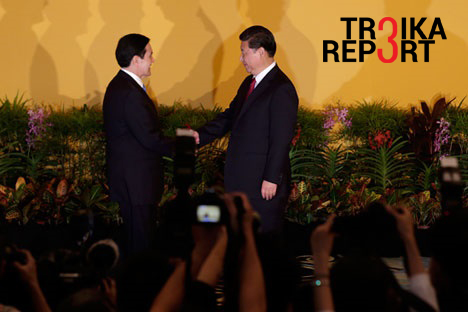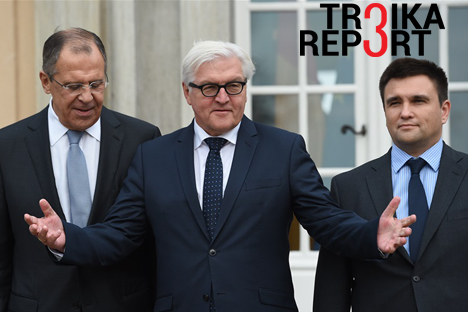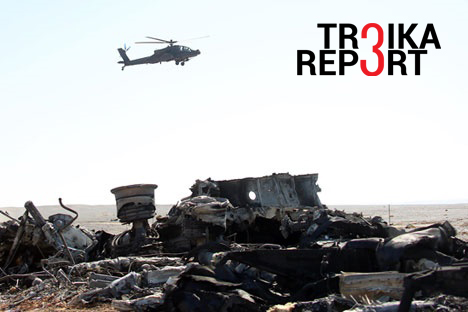TROIKA REPORT: Moscow watches as China and Taiwan take historic step

Chinese President Xi Jinping (R) and Taiwanese President Ma Ying-Jeou shake hands at the Shangri-La Hotel in Singapore, Nov. 7, 2015
EPA1. EU and Russia remain hostage to Ukrainian crisis as progress stalls

The latest meeting by the Russian, Ukrainian, French and German foreign ministers on diffusing the Ukrainian crisis, which took place in Berlin on Nov. 6, produced rather controversial results. Despite an upbeat assessment by German Foreign Minister Frank-Walter Steinmeier that the talks had “exceeded expectations,” it became evident that there was no chance whatsoever of finalizing the implementation of the Minsk agreements before the fixed deadline, the end of 2015.
On top of this disappointment came a strong statement by the European Union, laying the blame on Russia for the failure to implement in full the peace plan on resolving the conflict between government forces and Russian-backed rebels in eastern Ukraine. Consequently, Donald Tusk, the Polish politician who is now President of the European Council, made it clear that the economic sanctions against Russia will be once again prolonged after the end of the January deadline.
The provisional results of how both warring parties, the government in Kiev and the unrecognized rebel republics in eastern Ukraine, are moving forward in accordance with the letter and spirit of the Minsk agreements are largely disappointing. Nevertheless, the official statement by the German Ministry of Foreign Affairs has punctuated the consent of Kiev and the rebels, hammered out at the last meeting in Berlin, to adhere to the timeline for the withdrawal of heavy weaponry from the line of contact, as well as removing landmines throughout the Donbass region.
Meanwhile, despite the recent agreement made on holding elections in the mutinous republics of Donetsk and Lugansk, recent reports from eastern Ukraine do not bode well for complacency. Kiev and Donetsk-Lugansk are accusing each other of violating the ceasefire agreement. Kiev claims the rebels have been firing mortars at the entrenched government forces, while the rebels assert that the Ukrainian army has recommenced artillery shelling of civilian targets.
Amid confusing signals from the Donbass and the stuttering progress of peace negotiations, and with the European Union and the United States unwilling to relax sanctions against Russia, is there any indication of which direction things are likely to head in?
Sergei Markedonov, an associate professor at the Russian State University for the Humanities, provided his insight for Troika Report.
“First of all, the positive statements come as a surprise. The West has repeatedly stated that sanctions against Russia would be lifted only after a ‘breakthrough’ in the Minsk peace process is achieved. What qualifies as a breakthrough is mainly Kiev regaining control over the Ukrainian-Russian border and the re-incorporation of the Donbass into Ukraine. Unless this happens, there will be no cancelation of sanctions, either totally or even in part.
“As for Vladimir Putin and the Kremlin in general, I think they will want more concrete guarantees from Ukraine and the West that Kiev will not transform the country into a bastion and stronghold against Russia. In terms of control over the Ukrainian-Russian border, for Moscow this would be acceptable only after a comprehensive resolution of the conflict, just as it has been spelled out in the Minsk-2 agreement.”
- Let’s explore the EU’s tough stance on Russia. Modest progress on the ground within the mandate of Minsk-2 has apparently been achieved due to Moscow’s flexibility and persuasive power vis-a-vis the rebel republics of Donetsk and Lugansk, although they have an agenda of their own and inherent specific interests. Why is the EU reluctant to make a goodwill gesture, say, by lifting some of the sanctions? Such a move would meet the approval of the segments of European business hit by Moscow’s counter-sanctions.
“The European Union is not a single entity. It encompasses different policies towards Russia in the context of the Ukrainian crisis. But it abides by the rules of the union, which command discipline. This is presented as ‘solidarity.’”
“Then there is the external factor: The United States is playing a crucial role in the European security architecture. We have to take into account the position of the U.S. The U.S. is not ready to make serious compromises in respect to Russia, especially not on the eve of the presidential election campaign.”
Judging by this stern verdict, with the slow progress on the Minsk-2 peace roadmap and with the confrontation between the government in Kiev and the rebel republics in the east of the country still unresolved, it is challenging to identify an encouraging timeline for the abandonment of the war of sanctions and the restoration of a workable relationship between the European Union and Russia.
2. Egypt air disaster: Are Russia and the West now in the same boat?

With suspicions growing that the Russian Metrojet airliner that crashed on Egypt’s Sinai Peninsula on Oct. 31 was brought down by Islamist terrorists, the telephone conversation this week between British Prime Minister David Cameron and Russian President Vladimir Putin has possibly cleared the roadblock in bilateral relations between London and Moscow for a joint effort to unearth the truth, although no formal commitment to cooperate was made public.
Still, British intelligence appears to be in possession of solid proof that a bomb was planted on the Russian airplane by an offshoot of ISIS in the Sinai Peninsula. The plot was allegedly masterminded by Abu Osama al-Masri, an Egyptian cleric who has sworn allegiance to the Islamists of the self-proclaimed Caliphate. What’s more, the British media, citing Whitehall officials, reported that Cameron’s cabinet would help Egypt or Russia in a “kill or capture” mission, and that SAS operatives could be deployed to Egypt for this purpose.
Moreover, the Russian government has requested the F.B.I. for assistance in carrying out the investigation, and the U.S. federal agency has agreed to render professional help.
All previous attempts by Russia to forge a united front of global powers to fight against terrorists in the Middle East have failed. A single coalition against ISIS has not emerged. Yet certain positive signals were sent in the aftermath of the tragedy over the Sinai, opening the way for some cooperation between Russia and the West, firstly, in order to investigate the air crash and, secondly, to cooperate on security issues. Does this mark a watershed?
Vladimir Sotnikov, director of the East-West Strategic Studies Center, a Moscow-based independent think tank, sounded rather optimistic in his comments to Troika Report:
“The tragedy shows that whenever there are breaches in providing security, and in this case it looks like there were breaches in providing security for foreign nationals vacationing in Egypt, the threat of terrorism will increase. It affects the interests of thousands of people. Not only Russians. The actions taken by many foreign governments in the wake of the air crash prove that they share this approach.”
“Moreover, this tragic event shows that we have one enemy in common. And it has to be dealt with irrespective of any other thorny issues, for instance, the differences we have with the U.S. administration and the UK government over the crisis in Ukraine.”
“Despite recent hawkish statements that Russia is the main security threat to the West, there is a gleam of hope that there will be cooperation between the Western powers and Russia.”
Sotnikov emphasized that the phone conversation between Cameron and Putin was largely symbolic since London and Moscow remain at odds over major regional conflicts and security issues.
The road to putting together a global response to a global challenge will be bumpy. This week The New York Times seems to have reprinted a stereotyped viewpoint dating back to the peak of the Cold War by claiming that there is “deepening belief in the Russian public, stoked by Mr. Putin’s propaganda machine, that Western governments are conspiring against the country’s interests.”
This assumption does not resonate with the continuous insistence by Moscow that Russia will not neither shut down nor shut up, and will not opt for self-isolation. Russia’s recent concerted diplomatic engagement bears witness to the seriousness of Moscow’s intentions. The West in general, and the U.S. and UK in particular, are viewed as partners in pursuing a common goal.
The first signs of potential interaction between Russia and the West in clarifying the particulars of the catastrophe in mid-air coincided with a symbolic statement by Al Qaeda leader Ayman al-Zawahiri: “The Americans, Russians, Iranians, Alawites, and Hezbollah are coordinating their war against us – are we not capable of stopping the fighting amongst ourselves so we can direct all our efforts against them?”
The Europeans are conspicuously missing from the blacklist but it is hardly conceivable that they have been exempted, given the centuries-old perception by Muslim fundamentalists of Europeans as crusaders from the West. This call for “terrorists incorporated” should not be taken lightly.
If the West and Russia fail to realize that they are in the same boat or the same airliner, targeted by a common enemy driven by a deep-seated hate, and if they fail to admit that internal squabbling weakens them in the face of adversity, then the chances of winning not just the battle but the war against global terrorism are pitifully slim.
3. Moscow watches as China and Taiwan take historic step

The historic handshake between Chinese President Xi Jinping and Taiwanese President Ma Ying-jeou on Nov. 7, which lasted for more than a minute, was a deliberate manifestation that the two parts of this ancient civilization can positively engage with each other after all irrespective of ideological differences and past grievances.
Russia and other Asia-Pacific nations are viewing the dramatic reconciliation over the Taiwanese Straits with mixed sentiments, ranging from approval to apprehension, disdain and alarm.
One of the greatest schisms in modern history looks ready to be patched up, although not in a hurry, but in the tempo typical of China’s gradual advancement in the last two decades.
Mainland China, as termed by the islanders, and Taiwan have been locking horns since the civil war ended when the Nationalists, under Chiang Kai-shek, lost the battle for supremacy to the Communists under Mao Zedong, and were forced to flee to Taiwan. Ever since then the relations between the two culturally Chinese entities have been marred by animosity and suspicion.
The leaders of the two Cold War foes met for the first time in 66 years on neutral ground in the city-state of Singapore. The words of Chairman Xi – “We are one family” and “No force can pull us apart” – were interpreted as a signal that the long-cherished goal of unification with Taiwan has not been shelved.
The response of President Ma that “Both sides should respect each other's values and way of life” was read as an emphasis of the differences separating the mainlanders and the islanders, who for too long have been drifting under different sails and flags.
But is this truly a major turnaround in the turbulent history of relations between the Chinese mainland and the island so often labeled by Beijing as a “rebellious province” treacherously reluctant to join the motherland?Alexander Lomanov, Head research fellow of the Institute of Far-Eastern Economic Studies at the Russian Academy of Sciences, provided this answer to Troika Report:
“It is highly significant that both Taiwan’s and China’s leaders are able to sit together and talk about people-to-people cooperation, increasing trade and investment. The problem looked like a blind alley some 50-60 years ago when the only way of assimilation was by the use of weapons, by a Chinese invasion of the island. Now it is different, and both sides are talking about economic cooperation, and, in particular, about thousands of Taiwanese students getting support to study in China’s universities. In the 21st century China, having become an economic giant, is in a better position to deal with Taiwan.”
- In 1997 the British colony of Hong Kong became once again part of China, seen as a precedent for “piecing together” the lands inhabited by the Chinese. Recently, Chairman Xi has proclaimed sort of a Grand Chinese Dream concept, as an alternative to the American Dream, with the probable aim of luring the Chinese diaspora. Now we have witnessed the landmark meeting of Taiwanese and Chinese leaders. Are these all parts of a long-term trend?
“First of all, about the Hong Kong model. The model ‘one country, two systems’ was implemented in Hong Kong and Macao. In case of Taiwan, this is not applicable. The reason is simple. The fate of Hong Kong was not negotiated with the people living there but with the ‘colonial masters’ residing in London. Similarly, the fate of Macao was decided though talks with its former colonial masters in Lisbon.
“Taiwan is not a colony. Despite certain deficiencies, it is a democracy. Any negotiations on the integration of Taiwan would take much more time than in the case of Hong Kong and Macao, and would require more flexibility and delicacy.”
- To what extent could this historical handshake affect Russia’s national interests?
“For Russia, I think this is quite a positive development.”
“For Russia, China is not a liability but a very valuable asset. Back in the mid-90s, many critics were against Russia’s friendship with China due to the threat of being drawn into a conflict with the United States over Taiwan. This probability is diminishing year-on-year. It has been significantly reduced after this meeting between Ma and Xi.”
- Is that all? Is that the only gain Moscow can count on?
“The integration process embracing China and Taiwan would expand Russia’s economic outreach in the region. It would be beneficial for cooperation with both mainland China and Taiwan.”
Anyway, integration will not start overnight. Yet the Chinese proverb fits in well: A long march begins with the first step, and Mr. Ma and Mr. Xi have taken this step in what can be seen as an as-yet unrevealed attempt to strengthen the future of Greater China. In a region where symbols can well serve as substance, this is no small deal.
All rights reserved by Rossiyskaya Gazeta.
Subscribe
to our newsletter!
Get the week's best stories straight to your inbox